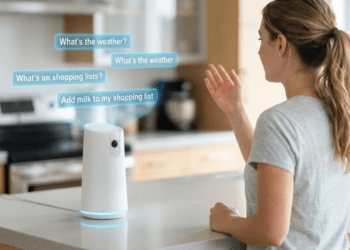The Partnership That Could Reshape Voice Assistants
Apple is reportedly in early discussions with Google about using the search giant’s Gemini artificial intelligence to power a completely revamped version of Siri. This potential partnership marks a significant strategic shift for the iPhone maker, which has traditionally preferred to develop its core technologies in-house.
According to Bloomberg’s Mark Gurman, Apple recently approached Alphabet Inc.’s Google to explore building a custom AI model that would serve as the foundation for a new Siri experience expected to launch in 2026. The discussions represent Apple’s latest attempt to catch up in the generative AI race, where the company has admittedly arrived late and struggled to gain meaningful traction.

Sources familiar with the matter told Bloomberg that Google has already begun training a model specifically designed to run on Apple’s servers. This custom approach would allow Apple to maintain some control over the user experience while leveraging Google’s advanced AI capabilities.
The Internal AI Battle: Linwood vs. Glenwood
Behind the scenes at Apple, an internal “bake-off” is currently underway to determine the future direction of Siri. The company is simultaneously developing two distinct versions of its voice assistant, each representing a different philosophical approach to AI development.
The first version, codenamed “Linwood,” relies entirely on Apple’s own AI models and represents the company’s traditional preference for in-house development. The second version, dubbed “Glenwood,” would be powered by external technology from partners like Google, OpenAI, or Anthropic.
This dual-track development approach reflects Apple’s uncertainty about the best path forward in AI. While the company has historically prided itself on controlling every aspect of the user experience, the rapid advancement of AI technology has forced Apple to consider whether partnering with established AI leaders might be more practical than building everything from scratch.
A History of Delays and Setbacks
The current discussions with Google come after a series of significant setbacks in Apple’s AI development timeline. The company originally announced an all-new Siri experience in June 2024, promising to deliver it as part of iOS 18. However, major roadblocks, leadership reorganization, and the decision to start over with a completely new system forced Apple to delay the launch.
The project is now targeting a spring 2026 release, representing a nearly two-year delay from the original timeline. This extended development period has given competitors like Google, OpenAI, and Anthropic additional time to advance their own AI capabilities, potentially widening the gap that Apple is trying to close.
The delays have been particularly frustrating for Apple leadership, as the company watches competitors gain ground in what many consider to be the next major computing platform. CEO Tim Cook recently told employees that while Apple may be late to the AI party, the company can still deliver a superior product that justifies the wait.
Beyond Google: A Multi-Partner Strategy
While Google’s Gemini has emerged as a leading candidate for powering the new Siri, Apple’s exploration of AI partnerships extends beyond just one company. Earlier reports indicated that Apple had also approached OpenAI and Anthropic about potentially using ChatGPT or Claude as the foundation for Siri’s AI capabilities.
According to industry sources, Anthropic’s Claude was initially viewed as the favorite among Apple executives. However, the AI company may be asking too high a price for licensing its technology to power Siri across Apple’s massive user base. This pricing concern has reportedly led Apple to expand its search for potential partners.
The company’s existing relationship with OpenAI, which powers certain ChatGPT integrations in Apple devices, demonstrates that Apple is already comfortable working with external AI providers for specific use cases. A Gemini integration would follow a similar model to these existing ChatGPT partnerships.
Technical Challenges and Server Infrastructure

One of the most significant technical challenges in any potential Google partnership involves ensuring that Gemini can run effectively on Apple’s server infrastructure. Unlike consumer-facing AI applications that can rely on cloud processing, Siri needs to provide fast, reliable responses while maintaining Apple’s strict privacy standards.
Google has reportedly begun training a specialized version of Gemini that could operate within Apple’s server environment. This custom model would need to balance performance with privacy requirements, ensuring that user data remains protected while still delivering the advanced AI capabilities that users expect from modern voice assistants.
Apple has also been developing its own AI infrastructure, reportedly testing its first trillion-parameter model that would be significantly more powerful than the 150 billion parameter models currently running on Apple servers. This internal development continues even as the company explores external partnerships, providing a potential fallback option if negotiations with outside providers fail.
Market Implications and Stock Performance
News of the potential Apple-Google AI partnership has already had significant market implications. Alphabet shares rose more than 3% following Bloomberg’s initial report, reflecting investor optimism about the potential revenue opportunity for Google.
The partnership discussions come at a particularly interesting time for both companies, as they face regulatory scrutiny over their existing search partnership. Google currently pays Apple billions of dollars annually to remain the default search engine on iPhones, but this arrangement is under antitrust investigation by the U.S. Department of Justice.
A Gemini-powered Siri could potentially provide both companies with a new revenue stream that might be less susceptible to regulatory challenges, while also strengthening their technological partnership in the face of increasing competition from other AI providers.
The Broader AI Landscape
Apple’s consideration of external AI partnerships reflects broader changes in the technology industry’s approach to artificial intelligence development. Even companies with substantial resources are finding it increasingly difficult to compete across all aspects of AI development, leading to more strategic partnerships and specialization.
Google’s Gemini has consistently ranked at the top of AI performance benchmarks, demonstrating capabilities that go well beyond current Siri functionality. Gemini can summarize videos, engage in complex conversations, and handle multiple types of input including photos, videos, voice, and text all areas where Siri currently lags behind competitors.
The potential partnership also highlights the growing importance of AI assistants in the broader technology ecosystem. As voice interfaces become more sophisticated and capable, they’re increasingly seen as a critical gateway for user interaction with digital services and content.
Privacy and User Experience Considerations
Any partnership between Apple and Google would need to address significant privacy and user experience considerations. Apple has built its brand reputation partly on its commitment to user privacy, often contrasting its approach with Google’s data-driven business model.
A Gemini-powered Siri would need to operate within Apple’s privacy framework, potentially limiting some of the data collection and analysis capabilities that make Google’s AI services so effective. This balance between functionality and privacy will likely be a key negotiating point in any potential partnership agreement.
Apple would also need to ensure that a Google-powered Siri maintains the seamless integration with Apple’s ecosystem that users expect. This includes compatibility with Apple’s various devices, services, and applications, as well as maintaining the consistent user experience that has become a hallmark of Apple products.
Looking Ahead: The Future of Voice Assistants

The potential Apple-Google partnership represents more than just a business deal it could fundamentally reshape the competitive landscape for voice assistants and AI services. If successful, it might demonstrate that even the largest technology companies can benefit from strategic partnerships rather than trying to develop every capability in-house.
For consumers, a Gemini-powered Siri could finally deliver the advanced AI capabilities that have been promised for years but never fully realized. This could include more natural conversation abilities, better understanding of context and intent, and integration with a broader range of services and information sources.
However, Apple executives remain weeks away from making a final decision about whether to proceed with an external partnership or continue developing Siri using internal AI models. The company has not yet chosen a specific partner, and negotiations with multiple AI providers are likely to continue as Apple evaluates its options.
The outcome of these discussions will have significant implications not just for Apple and its potential partners, but for the entire AI industry as it continues to evolve and mature. As the competition for AI dominance intensifies, strategic partnerships like this potential Apple-Google collaboration may become increasingly common as companies seek to leverage each other’s strengths while focusing on their core competencies.
Sources
- Apple eyes Google Gemini for Siri upgrade – Mashable
- Apple considers Google Gemini to power next-gen Siri – 9to5Mac
- Apple in Talks With Google to Use Gemini for Siri Upgrade – iPhone in Canada
- Apple is in talks to use Google’s Gemini for Siri revamp – TechCrunch
- Google shares rise on report of Apple using Gemini for Siri – CNBC










Comments 1